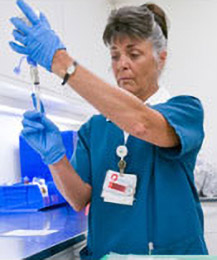
What interested you in becoming a pharmacy technician?
My interest in becoming a pharmacy technician started in 2000. I joined Walgreens as a cashier in the pharmacy. Walgreens taught me the retail portion of being a pharmacy technician and paid for my National Certification through the Pharmacy Technician Certification Board (PTCB).
What physical and/or soft skills do you need to succeed?
To succeed as a pharmacy technician you must be organized, alert, observant, and precise. This is a job with a lot of responsibility where errors can sometimes be a matter of life or death. In general, technicians receive written prescriptions and process insurance claim information. Then they count, weigh, and measure the medication, and compound pharmaceutical components, select the proper containers, and prepare and apply the labels.
Pharmacy technicians who work in hospitals or long-term care facilities are also responsible for reading and documenting patients’ charts and delivering the medications to the nursing station or the patients themselves. In high-tech facilities pharmacy technicians may use robotic equipment to assemble doses for each patient and dispense them when needed.
What interested you in working for Cleveland Clinic?
I came to Cleveland Clinic wanting more of this exciting career. I want to know how to make intravenous (IV) medications and to learn to compound medicines together, I wanted to see just how much I could learn.
What excites you about working as a pharmacy technician?
The constant learning is what excites me. Every day there are new drugs and new developments. It is constantly changing, and this makes it exciting.
What has been your most gratifying experience as a pharmacy technician?
Knowing that I know to help someone or pass on my knowledge is gratifying to me.
What career options do you have as a pharmacy technician?
As a pharmacy technician who certified, there are many options in this field. Pharmacy technicians can work in a wide variety of settings and institutions. According to the Bureau of Labor Statistics, approximately 71 percent of technicians work for retail pharmacies, drug stores, or chains.
Pharmacy technicians can also work in the military and for hospitals, nursing homes, or long-term care facilities. They can also work for home healthcare companies, mail-order pharmacies, and managed care facilities. In addition, they can work for educational or training companies, colleges, or for the pharmaceutical industry as sales personnel or trainers. Some pharmacy technicians go back to school and become pharmacists themselves.
Learn More
- Pharmacy technician programs affiliated with Cleveland Clinic.
- Visit the pharmacy technician profile for more about this career path.
- Explore the School of Pharmacy Technology webpage.